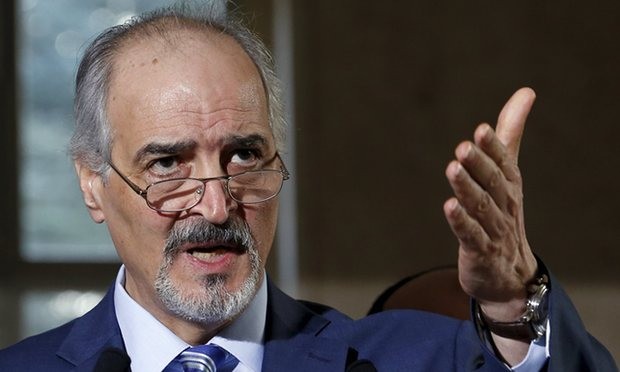Willy-nilly, Assad will remain a President, Syrian regime negotiator says

The political future of the president, Bashar al-Assad, has been excluded from negotiations to end the Syrian civil war, the head of the government’s delegation said on Monday.
At his first extended press conference, Bashar Ja’afari accused the Syrian opposition of harbouring terrorists, filibustering and refusing to engage with its demand for a common front to fight terrorism.
He also produced his firmest statement yet that he will not accede to opposition demands that Assad stand aside as part of rebuilding a new Syria. He said: “President Assad has nothing to do with the Syria-Syria talks.
“The [terms of] reference of our talks do not give any indication whatsoever with regard to the issue of the president of the Syrian Arab republic. This is something already excluded from the scene,” he said.
Progress had lagged in the first week of talks, he added, accusing the High Negotiations Committee (HNC), a Syrian opposition group, of failing to either respond to the government’s paper on basic principles or to submit any official paper of its own.
The UN special envoy on Syria and mediator in the Syria talks, Staffan de Mistura, hinted at his frustration over the government delegation’s tactics, saying he had pressed the government to define what it means by a political transition only to be told by Ja’afari that it was premature to discuss the issue.
De Mistura said he had replied to Ja’afari: “Premature means imminent, so far as I am concerned. It is clear that political transition is the mother of all issues. No one has questioned that so we will have to be realistic on that.”
De Mistura has been trying to lure the two sides into discussing a transition by sending them a paper with 29 questions asking them to set out their views on how a transitional body would operate.
But he expressed his fear that the talks were not proceeding quickly enough in view of potentially dangerous external events such as ceasefire breaches and military action by Turkey.
He said: “That is why I am in a hurry. The cessation of hostilities is still holding and the same is true of the movement on humanitarian aid, but neither can be sustained if we do not get progress on the political transition.”
He said it “was not a coincidence” that John Kerry, the US secretary of state, would be travelling to Moscow next Monday after this first round of Geneva talks had concluded this week, suggesting that Kerry and the Russian foreign minister, Sergei Lavrov, would assess the Geneva talks and consider what pressure needed to be applied to lift the blockages. “Nothing is coincidental and everything is connected,” De Mistura said.
But he said “there was a possible common understanding by the end of the week” on the guiding principles for the negotiations – something that constitute “a framework for what a future Syria would look like”.
The UN envoy also admitted his concern at the Russian warning earlier on Monday that it was prepared to take unilateral punitive action against those responsible for breaches of the ceasefire. Russia has said the US has failed to agree a common procedure on how to deal with ceasefire breaches. De Mistura said: “I am confident we can deal with it”.
In a lengthy press conference Ja’afari accused Turkey of aiding jihadis, said Israel was helping treat terrorists in its hospitals and alleged that bills for the medical costs being paid by Qatar. He also accused a large part of the opposition negotiating team of being terrorists, and said the HNC was only one of the Syrian opposition groups.
In the only glimmer of hope, Ja’afari said it was too early to assess whether the talks would work, and intimated there would be many further rounds of discussions ahead. With both sides aware that they cannot afford to be judged to be killing the talks, Ja’afari repeatedly said he was engaging seriously.
How to submit an Op-Ed: Libyan Express accepts opinion articles on a wide range of topics. Submissions may be sent to oped@libyanexpress.com. Please include ‘Op-Ed’ in the subject line.
- HoR-Backed Government moves to end fuel subsidy - December 26, 2024
- Libya and Algeria bolster customs cooperation - December 24, 2024
- Reports claim S-400, S-300 missiles moved to Libya - December 24, 2024


